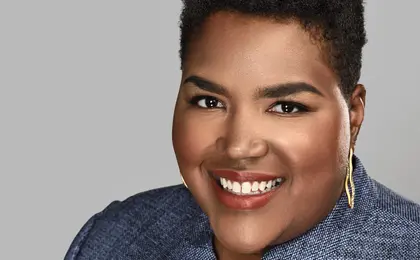
Claire Hughes Johnson ’01
MBA
Corporate officer and advisor, Stripe
Long before she led teams at Google, grew the payment processing company Stripe, or wrote a leading book about management practices, Claire Hughes Johnson ’01 made a split-second decision about a hypothetical investment that prefigured the clarifying insights that have helped her lead technology companies throughout her career.
In 2001, Hughes Johnson was an MBA student at Yale SOM. During a student venture capital and private equity competition, she and her team decided to invest in a company with a “highly technical” LED lighting product. In the championship round, one of the judges asked another team member what they would do if the product inventor jumped ship.
Hughes Johnson’s teammate didn’t have an immediate answer, but she did. Stepping forward, she said unequivocally that the deal would be off. As disappointing as it would be to walk away from the hypothetical investment, she said, the company was worth nothing without the scientist behind the invention. The team won the competition, and the judges later said that Hughes Johnson’s answer clinched the victory.
The experience was especially significant for Hughes Johnson because she was initially unsure what she could contribute to her team, which formed through a class taught by the late SOM lecturer David M. Cromwell. A former political campaign manager, she was awed by her teammates’ skills and experiences and “didn’t know what my particular contribution was,” she recalls.
The competition revealed that Hughes Johnson had a gift for understanding big-picture strategy, valuing talent, and integrating technology and company practices to help engineers create market-leading products. After graduating from SOM, she deployed her skills as a consultant; in roles at Google, including as vice president of the company’s self-driving cars project; and as chief operating officer of Stripe, where she remains a corporate officer and advisor.
“If there is a common thread in my career, it’s working with highly technical people, understanding them, and translating their insights and expertise into the bigger picture of the business that could be built,” she says.
Hughes Johnson, who grew up in Milton, Massachusetts, graduated from Brown University in 1994 with a degree in English and American literature; planning to go to law school, she took a heavy dose of political science coursework. But after working for then-Massachusetts attorney general Scott Harshbarger and serving as deputy campaign manager on his 1998 gubernatorial campaign, she realized that her appetite for risk was better suited to the business world than the law.
Hughes Johnson chose SOM in part because of its reputation for accepting students with non-traditional business backgrounds like her own.
“I didn’t take math in college,” she says. “If I was going to have a steep learning curve, I wanted to be with some like-minded students. I wanted to be in it together.”
She thrived in the school’s collaborative, team-based curriculum. In addition to Cromwell’s class, she enjoyed courses with the late professor and former dean Sharon Oster and the economist and negotiations expert Barry Nalebuff.
After graduating in 2001, she joined Braun Consulting, working on technology strategy with clients such as DirecTV, the New York Times, and Dow Jones, where she managed a consulting team of strategists and engineers. She could see that some clients weren’t grasping the transformative potential of the world wide web.
“The internet was transforming the world, and a lot of companies hadn’t figured that out yet,” she says.
Taking a leap of faith, Hughes Johnson left consulting and moved to California without a job. In 2004, she landed a position at Google, where her previous experience working with engineers made her a standout candidate.
For nearly 11 years, she worked in different operational, revenue, and product roles, including as vice president of Google’s self-driving car project (now Waymo), which was then in its early stages. But without a product on the market, she felt she wasn’t reaching her full potential as a leader.
“I realized, I’m not an R&D person,” Hughes Johnson says. “I need live customers.”
In 2014, Hughes Johnson left Google for Stripe. She was drawn to the company because its core offering—payment processing—is so essential to businesses’ success or failure.
“I wanted to put myself to the test,” she says. “I wanted to do something that felt core to economic opportunity.”
In more than six years as COO, Hughes Johnson helped Stripe build out its customer-facing functions, sales team, recruitment process, and management practices. She presided over a period of exponential growth: during her tenure, the company saw steep revenue increases and expanded from less than 200 employees to more than 6,000.
As Hughes Johnson and Stripe’s founders, the brothers Patrick and John Collison, met with the company’s users around the world, they noticed a theme. The users were not just asking about the mechanics of payment infrastructure; they wanted help with the bigger questions that were coming up as they grew their ventures.
“We’d think the conversation would be about payments, but they wanted to talk about company building,” she says.
The Collisons thought “there was a market gap,” Hughes Johnson remembers. They proposed that Hughes Johnson write a tactical book about company building and management practices.
In 2021, Hughes Johnson, who also serves on several corporate boards, stepped back from her day-to-day role at Stripe. The extra time allowed her to focus on the book. Scaling People: Tactics for Management and Company Building was published by Stripe Press in 2023 and named one of the best books of the year by Bloomberg and the Economist. The volume includes more than 100 pages of worksheets, templates, and exercises to help leaders and founders build their companies.
One major theme of the book is self-awareness, a quality Hughes Johnson says she developed at SOM.
“The diversity of the SOM student body, combined with the intense team time, is a prime environment for becoming more self-aware,” she says. “If you want to get good at leadership and management, you have to understand where you shine but also where you have blind spots.”
Leadership, she says, is in part “an ability to actively call on the skills of someone else.”
There are a few people who can have an outsized impact on their own—she points to the so-called “10x engineers” of the technology industry.
But, she adds, “the rest of us scale up through others,” she says. “I’m pretty adamant that if you’re going to manage people, you need to work on both your leadership and management skills. If you don’t, it’s not just a disservice to the humans involved; your business results are also going to suffer. Good management practices are non-negotiable.”





